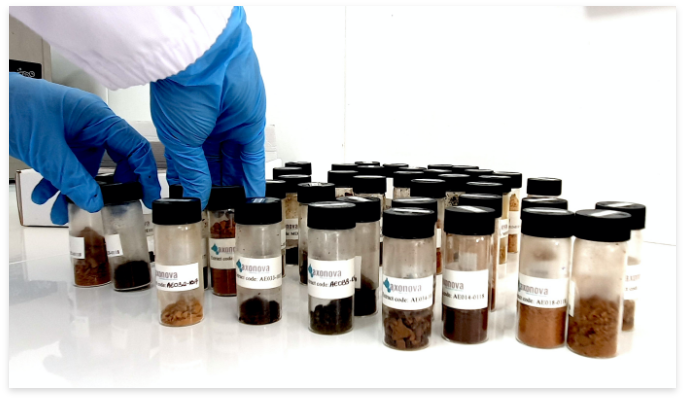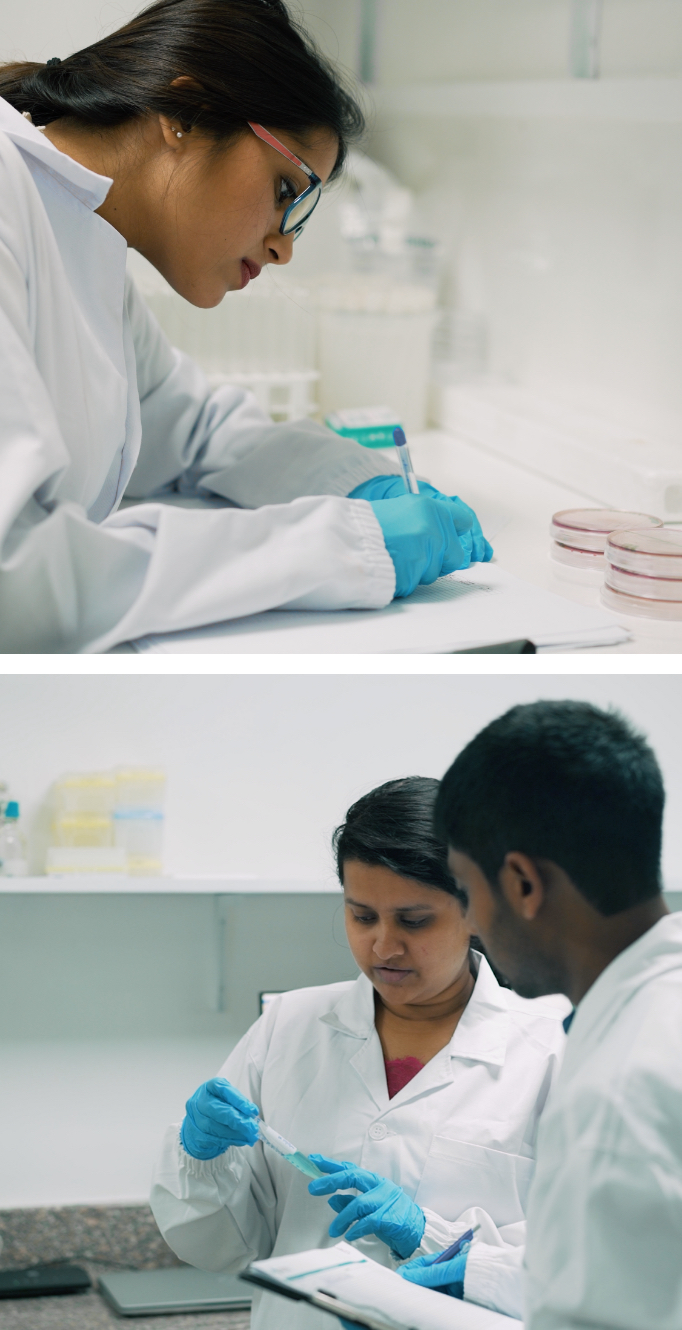Natural compounds &
extracts library
Axonova has developed an in-house library of extracts,
derived from endemic and native plants as well as marine organisms,
which have been characterized for their chemical constituents.
These extracts are documented for their traditional medicine data,
scientific data from literature as well as proprietary scientific
data gathered by in-house R&D.
The company is constantly enlarging its library, which is made available
to other partners for pharmacological screening against
biological targets of choice.
Axonova has developed an in-house library of extracts, derived from endemic and native plants as well as marine organisms, which have been characterized for their chemical constituents.
These extracts are documented for their traditional medicine data, scientific data from literature as well as proprietary scientific data gathered by in-house R&D.
The company is constantly enlarging its library, which is made available to other partners for pharmacological screening against
biological targets of choice.

Database of at least 180
endemic and indigenous plants
with detailed ethnobotanical and
pharmacological properties
78 plant extracts, with 22 extracts
characterised by UHPLC-UV/MS
45 plant extracts with potential
neurotrophic profiles
90 marine fractionated extracts with neuropharmacological characterization
80 purified marine-derived molecules with neuropharmacological characterization
5 plant extracts with neuro-active profiles
12 marine extracts with neuro-active
profiles
20 purified marine-derived molecules with
neuro-active profiles
40 phytochemicals with molecular
docking profiles
Database of at least 180
endemic and indigenous plants
with detailed ethnobotanical and
pharmacological properties
78 plant extracts, with 22 extracts
characterised by UHPLC-UV/MS
45 plant extracts with potential
neurotrophic profiles
90 marine fractionated extracts with neuropharmacological characterization
80 purified marine-derived molecules with neuropharmacological characterization
5 plant extracts with neuro-active profiles
12 marine extracts with neuro-active
profiles
20 purified marine-derived molecules with
neuro-active profiles
40 phytochemicals with molecular
docking profiles
R&D Pipeline
Axonova’s in-house R&D programs aim at identifying and developing new
compounds from medicinal plants and marine organisms, with proven
efficacy against neurodegenerative diseases. These innovative
compounds are then licensed to pharmaceutical and nutraceutical
companies for further development perspectives.

AXN-032: AXN-032 is an indigenous plant extract that has
been characterised by UHPLC-UV/MS. Out of 45 extracts screened, this extract
demonstrated high neurotrophic activity in in vitro neuron cell model.
The neurotrophic activity of AXN-032 occurs potentially via the BDNF/TrkB
pathway as it showed potent TrkB activating activity.
AXN-001: Plant-derived BDNF/TrkB modulators
This program, funded under the MRC-BRIG ($150,000 USD),
is a research collaboration between Axonova and the
University of Mauritius.
Axonova has established a library of extracts containing active molecules
from a selection of Mauritian medicinal plants that are known either from
traditional use, literature or chemical profiles to have central nervous system effects.
The extracts have been tested at Axonova under its different platforms.
From all the extracts screened, 5 showed promising neuroprotective properties.
Further characterization of the lead candidates is being conducted in
order to determine the mechanism of action and assess the therapeutic
properties in cellular models of Alzheimer’s and Parkinson’s diseases.
AXN-002: Marine-derived neuroprotective modulators
This program, funded under the MRC-RIB ($270,000 USD),
is a research collaboration between Axonova,
University of Western Cape (South Africa) and
University of Aberdeen (Scotland).
Our partners have already compiled a library of more than 160 extracts of
secondary metabolites derived from deep sea bacteria.
The program is now in the cellular screening phase,
aiming to identify lead extracts displaying
neuroprotective and neuroregenerative properties in vitro.
AXN-032: AXN-032 is an indigenous plant extract that has
been characterised by UHPLC-UV/MS. Out of 45 extracts screened, this extract
demonstrated high neurotrophic activity in in vitro neuron cell model.
The neurotrophic activity of AXN-032 occurs potentially via the BDNF/TrkB
pathway as it showed potent TrkB activating activity.
AXN-001: Plant-derived BDNF/TrkB modulators
This program, funded under the MRC-BRIG ($150,000 USD),
is a research collaboration between Axonova and the
University of Mauritius.
Axonova has established a library of extracts containing active molecules
from a selection of Mauritian medicinal plants that are known either from
traditional use, literature or chemical profiles to have central nervous system effects.
The extracts have been tested at Axonova under its different platforms.
From all the extracts screened, 5 showed promising neuroprotective properties.
Further characterization of the lead candidates is being conducted in
order to determine the mechanism of action and assess the therapeutic
properties in cellular models of Alzheimer’s and Parkinson’s diseases.
AXN-002: Marine-derived neuroprotective modulators
This program, funded under the MRC-RIB ($270,000 USD),
is a research collaboration between Axonova,
University of Western Cape (South Africa) and
University of Aberdeen (Scotland).
Our partners have already compiled a library of more than 160 extracts of
secondary metabolites derived from deep sea bacteria.
The program is now in the cellular screening phase,
aiming to identify lead extracts displaying
neuroprotective and neuroregenerative properties in vitro.

contact@axonova-pharma.com
+230 634 0130

